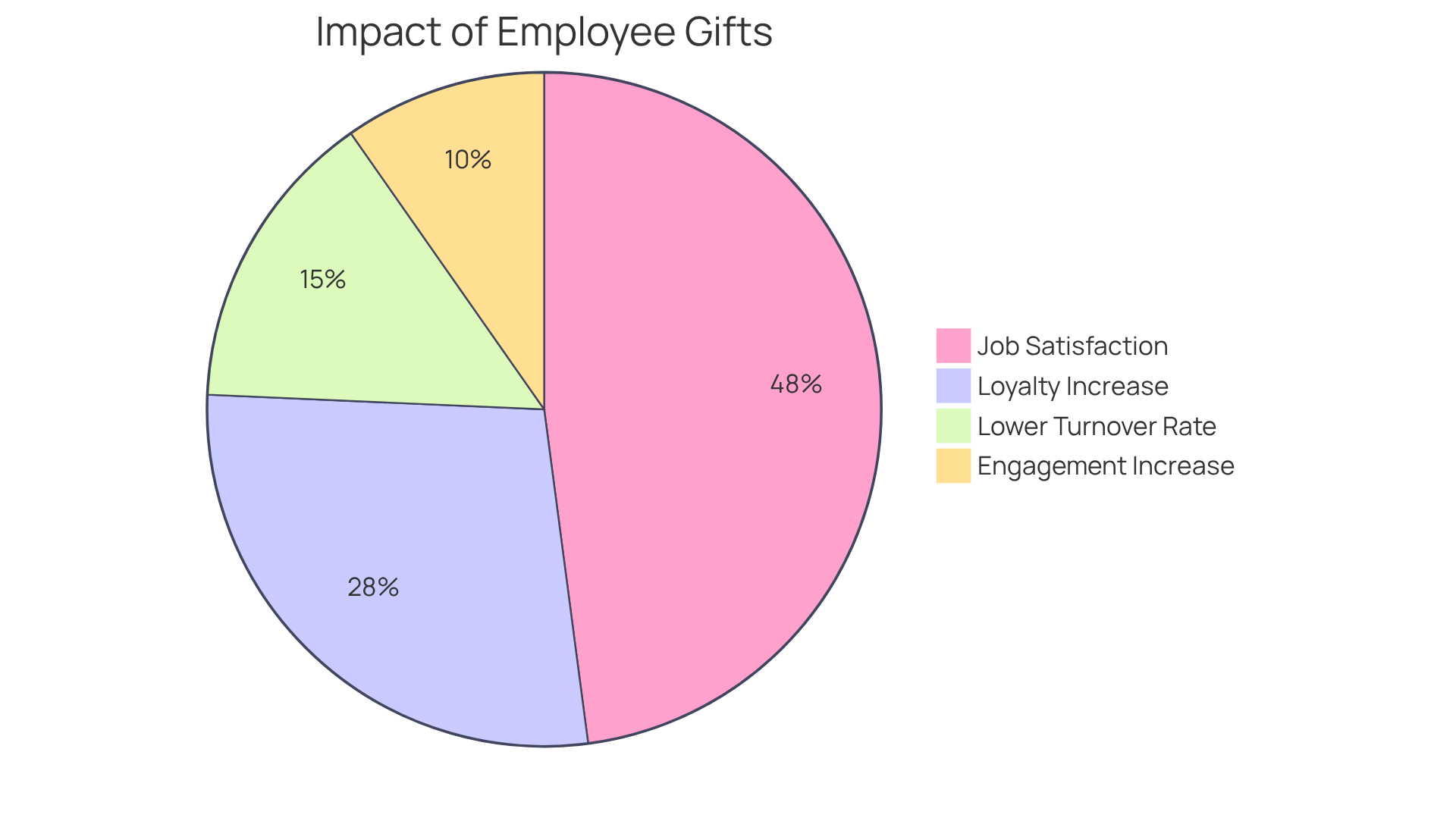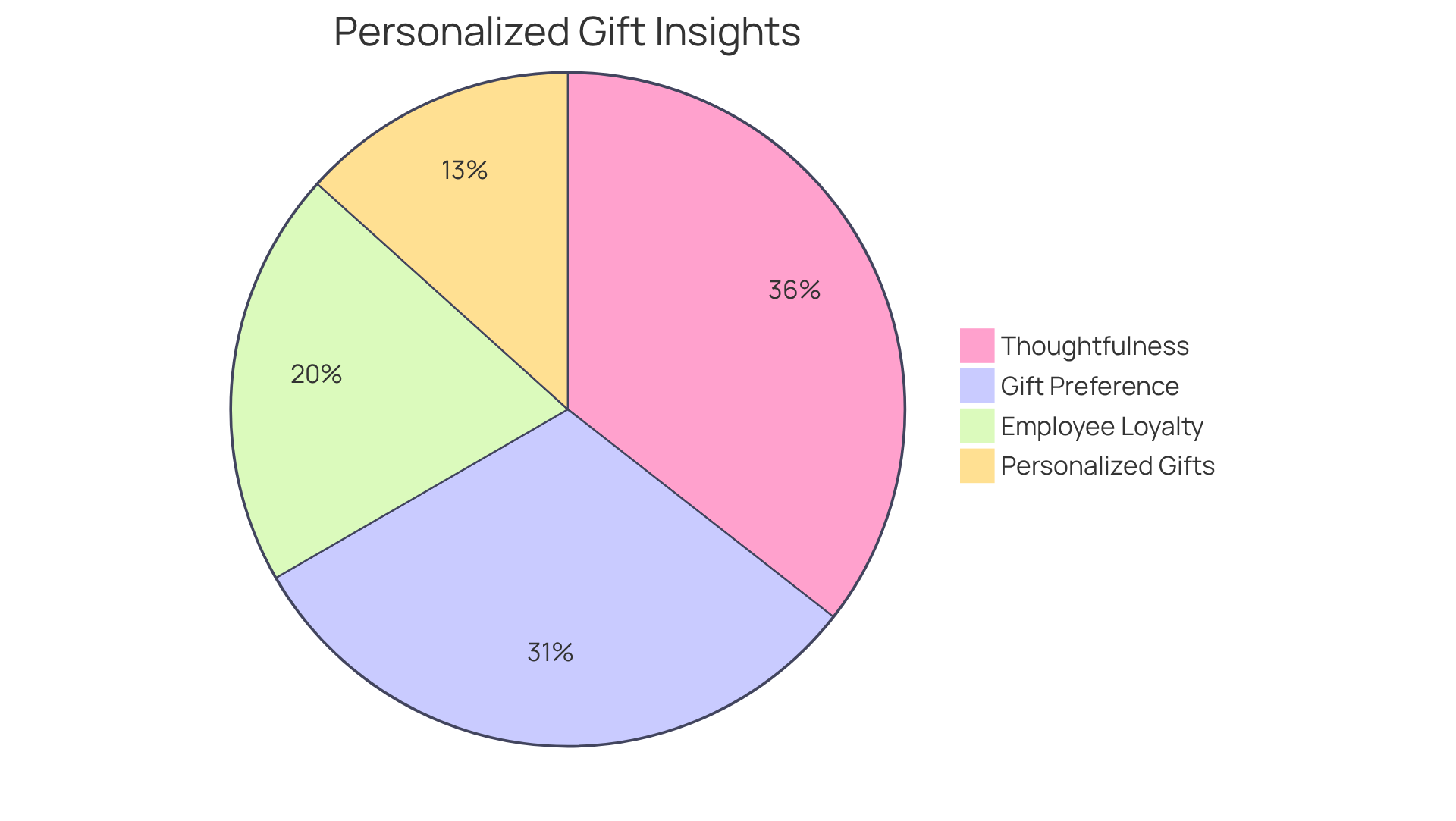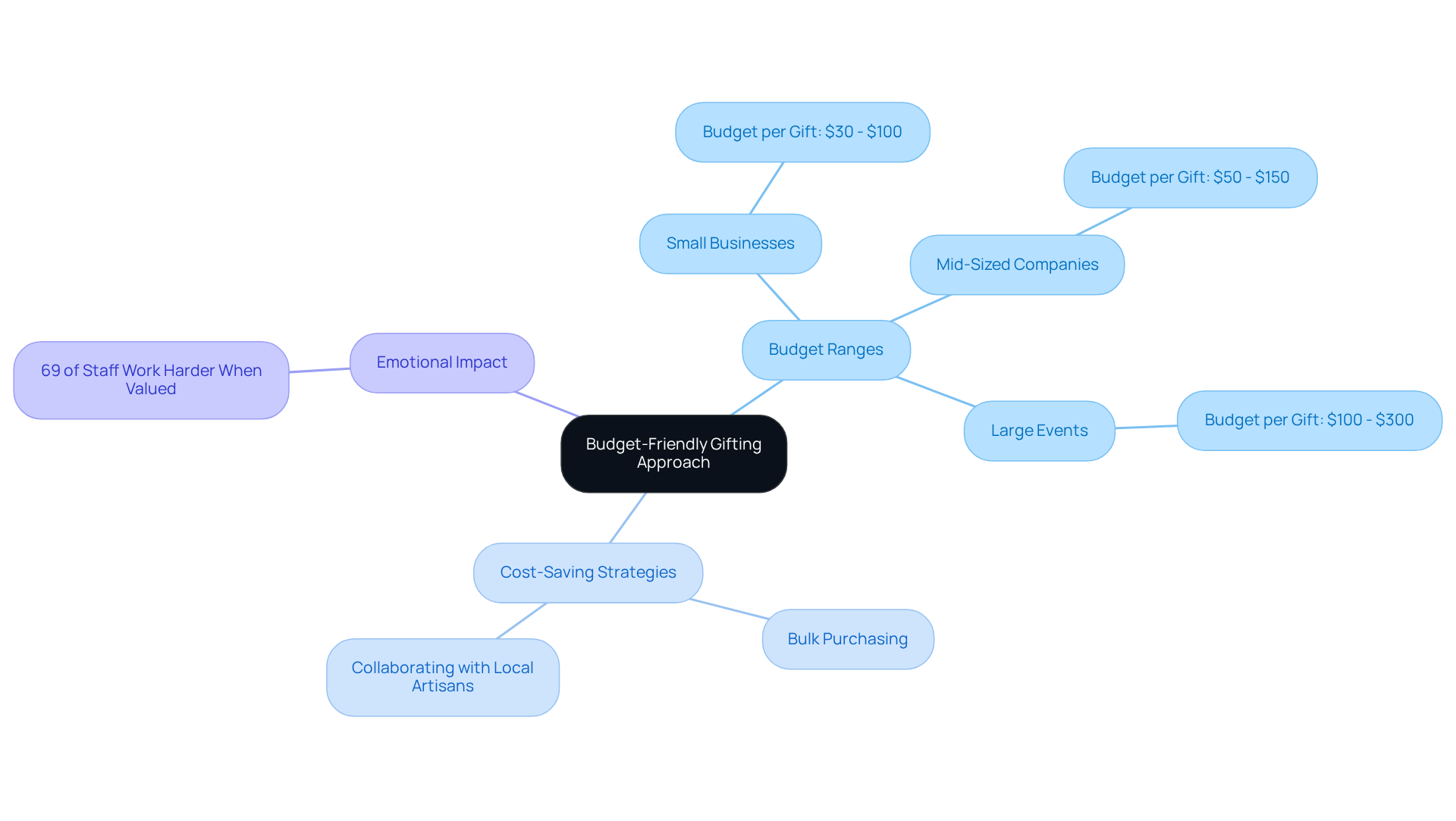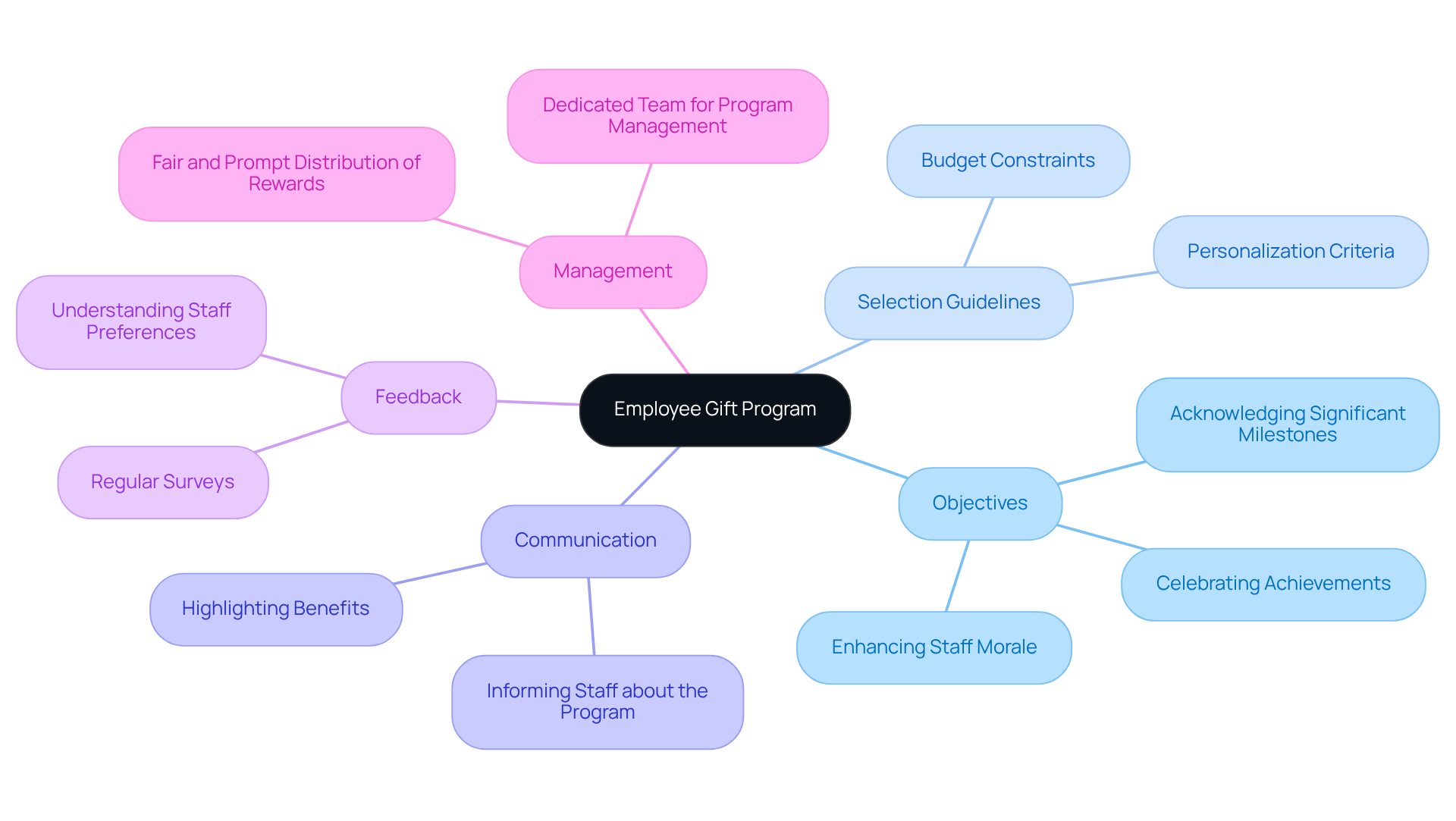Overview
Employee gifts significantly enhance engagement and loyalty by demonstrating appreciation and fostering a positive workplace culture. Personalized gifts, in particular, play a crucial role in increasing employee commitment. Data supports this assertion, revealing that recognition through gifting can lead to higher job satisfaction and lower turnover rates. This underscores the emotional connection that is built through thoughtful, customized gifts. By investing in such gestures, organizations not only acknowledge their employees' contributions but also cultivate an environment where loyalty thrives.
Introduction
Recognizing the contributions of employees through thoughtful gifting can significantly enhance workplace engagement and loyalty. Research indicates that personalized gifts not only foster a culture of appreciation but also lead to a remarkable increase in job satisfaction and commitment among staff.
However, with numerous options available, how can organizations effectively choose gifts that resonate with their team while remaining within budget?
This article explores essential gifting strategies that acknowledge hard work and cultivate a more engaged and loyal workforce.
Recognize the Importance of Employee Gifts in Engagement
Employee presents serve as a powerful demonstration of gratitude, underscoring the significance of each team member's contributions. Research reveals that acknowledgment through gifting can lead to a remarkable 14% increase in staff engagement. By recognizing hard work and dedication, organizations foster a culture of appreciation that enhances job satisfaction and nurtures loyalty. Notably, employees who received personalized gifts were 40% more likely to express loyalty to their employer compared to those who received generic items. This emotional connection is vital; individuals who feel appreciated are significantly more inclined to remain committed to their organization, effectively reducing turnover rates and associated costs. In fact, elevated employee engagement levels can result in a 21% lower turnover rate, emphasizing the critical role of recognition in retention strategies.
Moreover, presents can function as an essential resource for team development, cultivating shared experiences that strengthen bonds among coworkers. For example, customized items reflecting personal interests or achievements can ignite discussions and friendships, further enhancing workplace interactions. Impressively, 69% of staff members who received a present from their employer reported increased job satisfaction, illustrating the positive effects of such gestures on morale. Recognizing the importance of gifts for staff is crucial for crafting an impactful corporate rewards strategy that promotes engagement and loyalty. As highlighted by SHRM:
- "87% of HR professionals stated that recognition enhanced individuals' relationships at work,"
further emphasizing the value of thoughtful gifts in fostering a positive workplace culture.

Explore Diverse Gift Options for Personalization
Personalization is essential for impactful corporate gifts, as employees are more likely to appreciate items that resonate with their individual preferences and passions. A notable 70% of employees express a preference for customized gifts over standard options, underscoring the significance of tailoring offerings to personal tastes. This includes custom-branded items such as apparel and drinkware, alongside unique experiences like cooking classes or wellness retreats. Importantly, 30% of corporate gifts are personalized, highlighting the growing trend toward customized gifting solutions.
Moreover, incorporating elements that reflect the company’s values can enhance the significance of these gifts. Eco-friendly products or gifts supporting local artisans particularly resonate with individuals who prioritize sustainability. In fact, 45% of employees report feeling more loyal due to corporate gifts, illustrating the emotional impact of personalized offerings on employee commitment. By providing a diverse array of gift options and allowing employees to select their preferred items, organizations can foster a more engaging and inclusive environment. This strategy not only strengthens employee loyalty but also boosts overall satisfaction, as 80% of consumers believe that personalized gifts are more thoughtful than their non-personalized counterparts, positioning personalized gifts as a strategic investment in workforce engagement.

Establish a Budget-Friendly Approach to Gifting
Developing a budget-conscious approach for gifts for staff is essential for maximizing impact while keeping expenses manageable. Companies should begin by setting a realistic budget per employee for gifts for staff, which typically ranges from $30 to $100 for small businesses and $50 to $150 for mid-sized companies for occasions like work anniversaries and holidays. For larger events or promotions, budgets may increase to $100-$300, reflecting the significance of the occasion. Research indicates that companies typically allocate 1-3% of their revenue to gifts for staff, highlighting their importance in overall business strategy.
To optimize spending, consider:
- Bulk purchasing
- Collaborating with local artisans for discounts on personalized gifts
Incorporating low-cost yet meaningful gestures, such as handwritten notes or small tokens of appreciation, can significantly enhance the experience of giving without straining the budget. Notably, 69% of staff would exert more effort if they felt more valued, emphasizing the emotional effect of gifts for staff in promoting a culture of acknowledgment. By strategically managing their allocation budgets, organizations can ensure that every staff member feels valued with gifts for staff, ultimately boosting engagement and loyalty. As Katie Penner, Head of Sender Relations at Sendoso, notes, "Corporate gifting is an important tool to build relationships and show appreciation.

Implement a Structured Employee Gift Program
Establishing a well-organized staff rewards program requires a strategic approach to maximize its effectiveness. Begin by clearly defining the program's objectives, such as:
- Enhancing staff morale
- Acknowledging significant milestones
- Celebrating achievements
Establish selection guidelines that incorporate personalization criteria and budgetary constraints to ensure thoughtful choices.
Effective communication is paramount; all staff members must be informed about the program and its benefits. Regularly gather feedback through surveys to understand staff preferences regarding types of rewards, facilitating ongoing improvement of the program. Notably, 94% of employees who receive daily recognition report greater satisfaction, underscoring the importance of timely acknowledgment in maintaining the value of appreciation.
Designate a dedicated team or individual to manage the program, ensuring that rewards are distributed fairly and promptly. By promoting a structured approach to gifts for staff, organizations can cultivate a culture of appreciation that resonates with employees, ultimately enhancing engagement and loyalty. Furthermore, understanding employee preferences prior to launching the program is essential, as highlighted by HR consultant Danielle M. Jones, Esq. This insight can help prevent common pitfalls, such as superficial recognition, which can undermine the program's effectiveness.

Conclusion
Recognizing the significance of employee gifts is essential for enhancing engagement and loyalty within the workplace. Thoughtful gifting not only expresses gratitude but also fosters a culture of appreciation that leads to increased job satisfaction and reduced turnover. By implementing a strategic approach to gifting, organizations can cultivate a more committed and motivated workforce, ultimately benefiting their overall success.
The article highlights several key strategies for effective employee gifting:
- Personalization emerges as a vital element; customized gifts resonate more deeply with employees and foster stronger emotional connections.
- Establishing a budget-friendly approach ensures that gifting remains impactful without straining financial resources.
- A structured employee gift program, complete with clear objectives and guidelines, further enhances the effectiveness of recognition efforts, ensuring that every employee feels valued.
In conclusion, the importance of recognizing employees through thoughtful gifts cannot be overstated. Organizations are encouraged to embrace these practices, not only as a means of showing appreciation but also as a strategic investment in workforce engagement and morale. By prioritizing employee gifting, companies can cultivate a positive workplace culture that nurtures loyalty and drives success.
Frequently Asked Questions
Why are employee gifts important for engagement?
Employee gifts serve as a powerful demonstration of gratitude, highlighting the significance of each team member's contributions. They can lead to a 14% increase in staff engagement by fostering a culture of appreciation.
How do personalized gifts impact employee loyalty?
Employees who received personalized gifts were 40% more likely to express loyalty to their employer compared to those who received generic items, indicating that emotional connections are vital for retention.
What effect does employee recognition through gifts have on turnover rates?
Elevated employee engagement levels from recognition can result in a 21% lower turnover rate, emphasizing the importance of recognition in retention strategies.
How can gifts contribute to team development?
Gifts can create shared experiences that strengthen bonds among coworkers. Customized items reflecting personal interests or achievements can spark discussions and friendships, enhancing workplace interactions.
What percentage of employees report increased job satisfaction from receiving gifts?
69% of staff members who received a gift from their employer reported increased job satisfaction, demonstrating the positive effects of such gestures on morale.
What role do gifts play in corporate rewards strategies?
Recognizing the importance of gifts for staff is crucial for crafting an impactful corporate rewards strategy that promotes engagement and loyalty.
What do HR professionals say about the impact of recognition on workplace relationships?
According to SHRM, 87% of HR professionals stated that recognition enhanced individuals' relationships at work, highlighting the value of thoughtful gifts in fostering a positive workplace culture.


